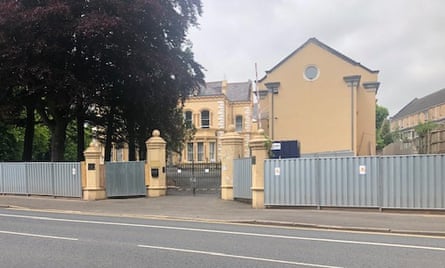It’s not quite the Great Wall of China, more of a big wall in Belfast, but large enough to provoke a bitter diplomatic row between residents in one of the city’s most salubrious addresses, the Chinese state and the city council.
Belfast city hall has allowed the Chinese consulate to build a security barrier around its headquarters in the affluent Malone area, claiming that Chinese officials have diplomatic immunity from the region’s strict planning laws.
But those living in the upmarket Malone ParkAdelaide Park district have obtained a letter from Northern Ireland’s attorney general assuring them that there is no such immunity for building on land sited within a conservation zone.
Residents angry about the council’s decision to ignore normal planning application rules have alleged it is motivated by a desire to entice Chinese economic investment into Northern Ireland at any price.
Construction to fortify the exterior wall of the Chinese consulate, which opened five years ago in south Belfast, began in February. Builders were flown in from China to erect the barrier and they have worked at the site throughout the coronavirus crisis.
The work has continued even though Chinese diplomats did not apply for permission for the project through the normal planning procedures.
In a letter to Martin McBurney, who lives across the road from the consulate, a Belfast city council official said the Chinese had the right to build the wall under the 1961 Vienna convention on diplomatic relations – the international act of law that grants immunity to diplomats in foreign countries.
“In relation to your query regarding diplomatic immunity, the consulate has consistently asserted that their premises are inviolable by virtue of the fact that the premises have been designated as consulate premises by the secretary of state,” the council letter states.
On the possibility of the council or anyone else seeking to halt construction until a planning application from the Chinese consulate was accepted, the letter continued: “The consulate would claim diplomatic immunity in any subsequent court action rendering the court action pointless. The ability to rely upon diplomatic immunity applies regardless of the nature of the alleged offence.”

McBurney said residents had objected to the wall because of a lack of transparency and the fact that the work was taking place within a conservation area. Even the trees in the street, he pointed out, were subject to conservation orders.
“The council’s excuse for not putting this project through the normal planning application process struck me as incredulous and I contacted the attorney general’s office to establish if diplomatic immunity applies in this case,” he said.
In a letter from the office of the attorney general, John Larkin QC, Northern Ireland’s most senior law officer said the Vienna convention “does not exempt such premises from the requirements of domestic planning law”.
The office advised the city council that it was its duty “to consider properly the full extent of its own powers and duties in this area”.
It noted that if the Chinese consulate refused to comply with any enforcement notice the Foreign and Commonwealth Office may have to intervene. “There is no bar in international or domestic law to an enforcement notice being issued against the consulate,” it said.
McBurney said the attorney general’s response posed questions as to the real motive behind allowing the consulate to go ahead with construction before any planning application was approved.
“The only reason I can think of is purely business. It is a question of being so desperate to bring in Chinese business investment that the council can ignore our concerns and the normal planning laws that apply to everybody else.”
The residents have been backed by the South Belfast SDLP councillor, Gary McKeown. He said: “The people of the area are at a loss as they watch construction work taking place with no planning permission, and nothing apparently being done to stop it.
“This is a neighbourhood with a distinct historical character, which is subject to strict conservation rules – residents can often need permission to simply paint a gable wall or replace a window frame – which makes this issue all the more frustrating.”
A Belfast city council spokesperson said: “The works at the Chinese consulate are the subject of a current planning enforcement investigation which is ongoing. At this stage we cannot provide any further information as it could impact on the investigation, which is seeking to resolve the issues that have been raised to the council.”
However, McBurneysaid work continued at the site on Wednesday. “This work has been going on since February and it continues all through this week non-stop,” he said.
The Chinese consul-general has been approached for comment.
